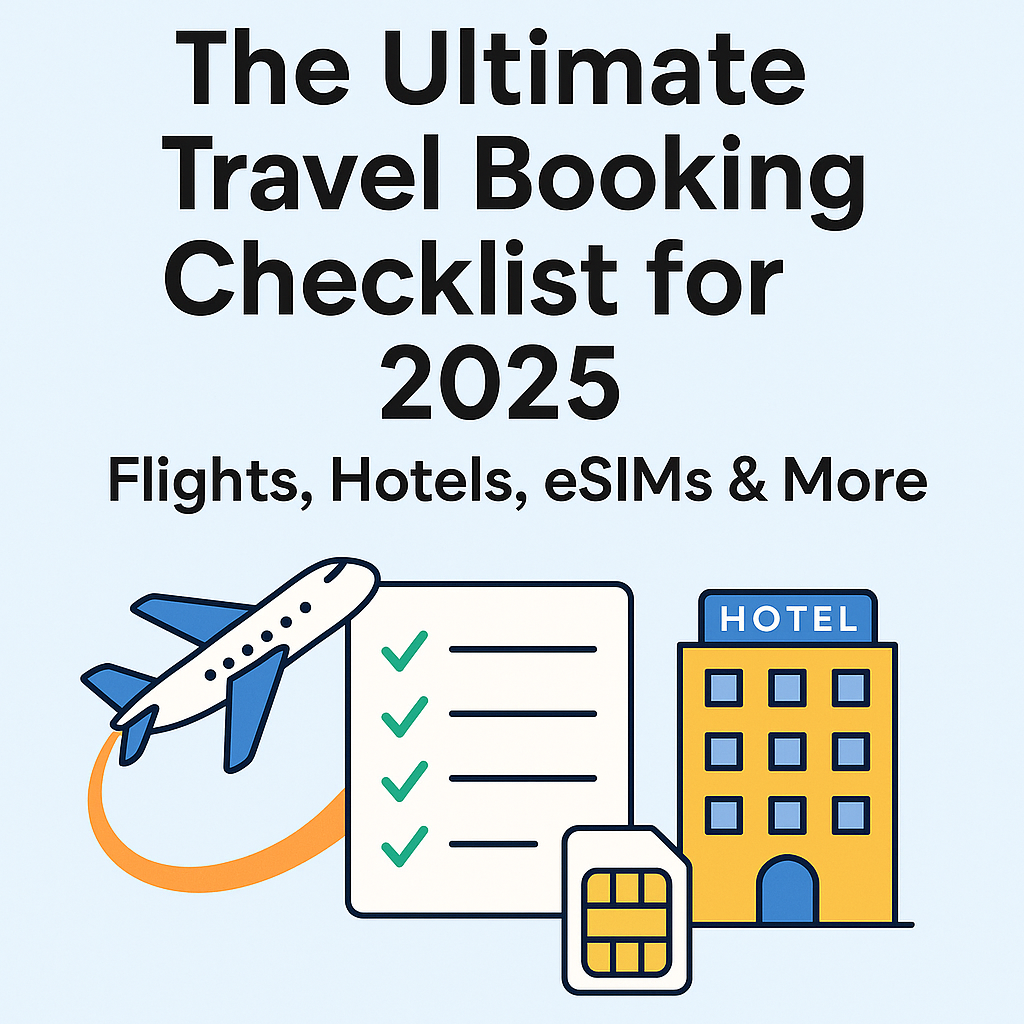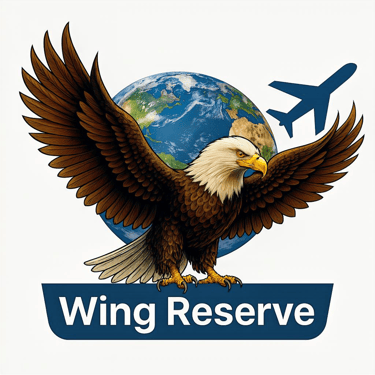The Ultimate 2025 Travel Booking Checklist: Flights, Hotels, eSIMs & More
7/8/20245 min read


The Ultimate 2025 Travel Booking Checklist: Flights, Hotels, eSIMs & More
Travel in 2025 is more unpredictable than ever: airfare and hotel prices have climbed steadily, visa processing can be slow, security screenings are stricter, and flight cancellations or delays are common. Having a detailed pre-travel checklist can protect your budget and sanity. For example, comprehensive travel insurance typically costs only about 4–10% of your trip, but can reimburse thousands in medical bills or trip cancellations. Likewise, careful planning (from valid passports to flight timing) can save you hundreds. Follow this checklist step-by-step to stay safe, connected, and budget-friendly on your next trip.
Pre-Booking Essentials
Passport, Visas & Documentation: First, double-check your documents. Ensure your passport is valid at least six months beyond your travel dates and has at least one blank visa page. Verify visa requirements for each destination well in advance—some countries demand proof of onward travel or hotel bookings when you apply. Keep copies of your passport and visa, and consider enrolling in your government’s travel-registration program for alerts and emergency assistance. Finally, email your full itinerary and insurance details to a trusted friend or family member so someone knows your whereabouts.
Travel Insurance – Secure It Early: Don’t skip insurance. Choose a comprehensive plan that provides emergency medical coverage and medical evacuation—experts suggest about $50,000–$100,000 for medical and $100,000–$250,000 for evacuation on international trips. Make sure it also covers trip cancellation, lost baggage, and trip delays. Buy it when you book your trip to use the “free-look” window, which lets you cancel for a full refund if the policy doesn’t meet your needs. Read the fine print for exclusions like known epidemics or pandemics—if those aren’t covered, consider adding a “cancel-for-any-reason” option. Keep your insurer’s contact info handy and store a digital copy of your policy in the cloud for easy access.
Booking Flights & Accommodation
International Flights – Timing Is Critical: Booking international flights three to six months before departure usually yields the lowest fares, while domestic travel often peaks at one to three months out. Flight‐search sites like Trip.com, Kiwi.com and WayAway let you monitor price swings and set up alerts, and various analyses show that booking on Sundays can cut costs by as much as 15–17 percent compared to busier weekdays.
Flying on a Tuesday, Wednesday or Thursday also tends to be cheaper, thanks to lower demand outside weekends. Starting your search early, keeping travel dates flexible and acting immediately on price alerts will put you in the best position to snag budget-friendly tickets.
Hotels & Bundled Packages: Compare booking flights and hotels separately versus as a package. Bundling can trigger extra savings: for example, Priceline reports its customers save an average of about $240 per trip by bundling a flight and hotel, and Hotellook claims up to 60% off bundle. However, bundling isn’t always the best deal (some brands give better direct discounts), so always price-check both ways. Aim for flexible rates: refundable or changeable hotel bookings add a few dollars but can save you penalties if plans shift. Join hotel loyalty programs and frequent-stayer schemes – even basic membership often gets perks like free breakfasts, late check-out, or complimentary room upgrades, which add comfort and value without extra cost.
Connectivity & Tech Prep
eSIM Setup – Stay Connected Seamlessly: Skip expensive international roaming by using a travel eSIM or global data plan. An eSIM is a digital SIM card you activate via QR code, so you can install and test it before you leave home. Travel experts note that using an eSIM lets you “beat” airport roaming rates and avoid fumbling with physical SIM. In practice, just scan the QR code in your hotel or at home, and you’ll have phone/data service the moment you land. (No need to wait for delivery or worry about losing your main SIM.) Shop around: many providers, like Airalo, offer regional or global data bundles in the hundreds of destinations. Read reviews of top eSIM services to find competitive rates and the best coverage for your itinerary.
Must-Have Travel Apps: Modern travel is 99% digital, so arm yourself with apps:
Offline Maps: Maps.me, Google Maps (download areas), or Maps Offline let you navigate without data.
Translation: Google Translate (with offline languages) or iTranslate keep you understanding menus and signs.
Local Transport: Uber or Lyft where available; City mapper for public transit in big cities; local taxi or rideshare apps (download home apps like Grab or Didi for Southeast Asia, etc.).
Weather & Alerts: A weather app and any local alert app (like AccuWeather’s app or local emergency notification apps) to keep informed of delays or advisories.
Packing & Pre-Departure Must-Dos
Carry-On Essentials: Pack your carry-on (personal bag plus one onboard item) carefully, because losing checked luggage or waiting at the carousel wastes precious time. In your carry-on include critical documents (passport, boarding passes/tickets, insurance card), necessary electronics (phone, charger, power bank, travel adapter, headphones), and health/safety items (medications, a face mask, hand sanitizer, travel-sized first-aid kit, and some snacks). Carry on an extra set of undergarments or a change of clothes in case of delays. Keeping these items close means you can handle minor emergencies without scrambling.
Smart Packing Strategies: Save space and avoid fees: use packing cubes or compression bags, and roll clothes instead of folding to fit more in a suitcase. Weigh your checked bag with a small digital scale before leaving home to avoid overweight charges. Lock your checked baggage with TSA-approved locks so security can open it if needed. And whenever possible, travel carry-on–only: packing light lets you skip baggage claim and moves you through airports faster (especially helpful during tight connections or unexpected delays).
On-Ground Logistics & Home Security
Pre-Arrange Local Transfers & Rentals: Before you leave, book any ground transport you’ll need on arrival – airport shuttles, rideshares, or rental cars. Early booking locks in better rates and ensures availability (especially during holidays or high season). Check cancellation policies: some sites or apps (like GetRentalcars.com) allow free cancellation within the first 12 hours after payment and at least 48 hours before the start of the car rental. Compare third-party aggregators with direct options (e.g. Hertz, Avis websites) to find the best deal. Also arrange any long-distance transfers (train or intercity bus) if your trip has multi-city legs, to save time later.
Home Safety Checklist: Don’t forget home security. Pause mail and newspaper delivery, or ask a neighbor to collect them, so it doesn’t accumulate. Unplug non-essential appliances (TVs, electronics) to prevent fire risk. Set timers on a couple of lights to make your home look occupied. Inform a trusted neighbor or friend of your travel dates and share an emergency contact. Do a final sweep: make sure all doors and windows are locked, alarms and smoke detectors are active, and valuables are secured or hidden.
Bonus Tips & Trends for 2025
Maximize Points & Loyalty: Credit-card travel rewards and airline/hotel loyalty points can cut major costs. If you have points or miles, compare point-redemption vs cash prices – some “points + cash” deals get you great value. Many travelers routinely apply points to flights or upgrades; if you’re not already, sign up for (and keep) at least one flexible travel rewards card or a co-branded airline/hotel card to earn points on everyday spending. (Some cards even offer bonus points for travel purchases.) Use hotel or airline loyalty status for free amenities: even mid-tier status often unlocks free breakfasts, luggage waivers, or priority check-in.
Flight-Delay & Cancellation Protections: Modern plans usually include trip-delay benefits by default. For example, Squaremouth reports that “trip delay protection is included in almost all policies at no additional cost” squaremouth.com. This means if your flight is significantly delayed (often 3–6 hours), the insurer can reimburse meals, hotels, and essentials while you wait. Some plans even automatically cover missed-connection expenses or reimburse cancelled-trip costs. Double-check these benefits: delay coverage can relieve a lot of stress (and expense) if bad weather or schedule changes strike.
Travel smarter by ticking off every item before you go. From securing visas and insurance early, to packing carry-on ready and planning your itinerary in advance, these steps will save you money and headaches. The more thoroughly you prepare, the smoother your trip will be – so you can focus on enjoying the journey.
Ready to customize this checklist for a particular destination or travel campaign? Tailor each item to local conditions (for example, specific visa rules or eSIM providers) and let’s collaborate to make your travelers’ experience even better.
Safe travels and happy booking!
WingReserve Blog
Discover tips and guides for your adventures.
Services
Journey
© 2024 WingReserve.com. All Rights Reserved.
Reach Us
Email:
Quick LinkS
